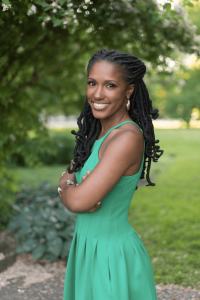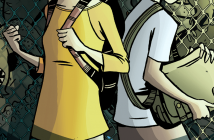 The first time I came across Imani Josey was on Twitter, when her cover reveal for The Blazing Star went live. I was immediately taken by the cover. One, because it’s gorgeous, and two, because there’s a woman of color featured front and center.
The first time I came across Imani Josey was on Twitter, when her cover reveal for The Blazing Star went live. I was immediately taken by the cover. One, because it’s gorgeous, and two, because there’s a woman of color featured front and center.
When sixteen-year-old Portia White accidentally touches a scarab, she is transported to ancient Egypt—her sister and an unwitting freshman in tow. Stalked by vicious monsters called Scorpions, every step in the direction leading them back home means a step closer to danger. As Portia and the girls discover that they’re linked to the past by more than just chance, they have to decide what it truly means to be yourself, to love your sister, and to find your way home.
The Blazing Star is available now. For more on Josey, follow her on and and listen to her podcast Introvert Problems.
Some people plan out their stories to the minor detail, others are pantsers who go with the flow. When you began The Blazing Star, what went into your decision to write about young characters of color? Or did the characters come to you that way from the beginning?
I’m a pantser by nature, but I quickly realized that this natural inclination wouldn’t help me write a book. I had to discover my book-writing process and (grumbles) outline the story. I knew my protagonist was black from the beginning. I heard her voice as much as I understood her concerns, the nuances of her perspective, and how the world reacted to her. It wasn’t a conscious decision to make Portia black, but it was definitely a conscious decision to keep her black. There is pressure to whitewash your characters. You wonder if talking about them getting press and curls, or experiencing colorism, will turn a wider audience off. And sure, it might. But there is also an audience starving for what you’re creating. I know, because I’m part of it. I wrote the book because it’s full of everything I’ve always wanted as a reader.
There have been quite a few studies showing the lack of black characters and black writers in YA. Why is it important to you to include characters like you in your work?
Representation matters. Seeing people like you living fulfilled lives and having agency is a reminder that you, too, can live a fulfilled life and have agency. There’s not a lack of black characters and black YA writers because we aren’t writing. It’s because the material is getting blocked by gatekeepers who are either willfully ignorant or blithely unaware that audiences of color want to see the Civil Rights Movement, the Antebellum South, AND Harry Potter, Back to the Future and kissy love stories a la Nick Sparks. We want history, and speculative adventure, and to witness every facet of life that our white counterparts get. #weneeddiversebooks
Some writers struggle with their decision to write their own voices. They worry their stories will be too queer, or too black, or too whatever it is for them to be accepted by publishers or readers. Did this factor in your decision to write an ownvoices book?
Sure did. One of my writing mentors, Shveta Thakrar, who also took a turn at editing The Blazing Star, reminded me how important it is the central characters are black girls and not to shy away from cultural references. Like I said before, there is tremendous pressure in publishing and just living life as a POC to assimilate as best you can. But denying who you are and what you’ve seen and how you live in this world is deny your agency. And the question becomes, who am I trying to make comfortable? Is it worth it?
What was your favorite thing about writing The Blazing Star?
Magic. Magic black girls. Time travel. Egyptian princes. Playing with the mythology. THE MAKE-UP. Maneuvering a complicated sister relationship. Telling my teen sister that I have a book for her to read, with a black girl with natural hair on the cover. Fulfilling a life-long dream to write a book and become an authorpreneur.
Many of the books featured on YA Interrobang tend to be traditionally published. The Blazing Star is a self-published novel. What went into your decision to self-publish?
And thank you so much for featuring it! A lot of blood, sweat, and tears (and my savings) have gone into bringing The Blazing Star to life, and I’m so appreciative that you’re letting me yap about it. I wanted to go traditional at first. I think we all imagine becoming the next JK Rowling or Suzanne Collins when we write. But to be frank, I was having a hard time getting the content past the gatekeepers, receiving a lot of “I don’t connect with the voice” rejections. So I drained my savings and sold my car because I didn’t want to give up on this story. I did everything I could to make this look as beautiful as any traditionally published novel, and the neurotic Virgo in me loves the freedom going indie provides. I have my pub journey here if you want to check out the podcast I did on it. My first name means faith in Swahili, so this journey has been a lesson in stepping out on it.
What advice would you offer to a young black writer reading this about pursuing their dream of writing?
Keep writing. Keep reading. Keep editing. Get critique partners and if you can, hire professional editors. I enjoy professional editors because I like line edits (even though they’re like suffering the Dementor’s kiss) more than big picture edits. Have a thick skin, or get ready to develop one. Be hands on but learn to let go. Save your money and make connections. Know what you’re up against. Don’t give a shit anyway.
Is there anything that you’d like the folks reading this to know about you, your novel, or anything in general?
I have a podcast that you should check out called Introvert Problems!





